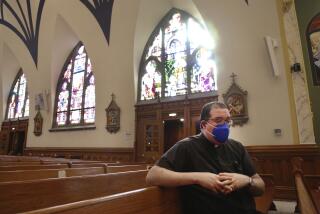Catholic Rite of Confession Wanes; Bishops, Laity at Odds on Reasons : Spirituality: The bishops surveyed blame the drop on a ‘less pervasive sense of sin,’ saying it could lead to ‘spiritual ruin.’
- Share via
A study of the moribund practice of confession in the Roman Catholic Church, released by U.S. bishops this week, shows that prelates and parishioners differ sharply on why the majority of active Catholics seldom, if ever, confess their sins to a priest.
Bishops attributed the 25-year decline primarily to “a less pervasive sense of sin,” which parishioners ranked seventh as a reason, along with their alleged “general confusion over what is right or wrong.”
Lay Catholics said the biggest reason they do not confess is that they experience reconciliation with God through other means--receiving Communion, personal prayer, an act of contrition or talking with a friend. Each example was cited by more than half of the lay people surveyed, according to William Ryan, the Washington-based spokesman for the U.S. bishops.
This attitude holds the potential for “spiritual ruin,” according to the study released by the Bishops’ Committee for Pastoral Research and Practices. Confession was commonly sought weekly or monthly by American Catholics before the innovative Second Vatican Council (1962-1965).
The committee blamed the declining interest in the sacrament of penance, as it is called, on competing moral views in American society. Some observers have said Protestant theology is to blame because it holds that individuals can seek forgiveness on their own.
The bishops’ study found that among 2,500 priests sampled in a 1988 survey, 8% confessed sins weekly, 27% monthly, 47% every two or three months and 18% annually. “Thus we can conclude that 82% of the priests in the United States receive the sacrament of penance quite frequently,” the report said.
The survey of the laity, taken from parishioner lists in three unnamed dioceses, found that 4% went weekly, 5% monthly, 17% every two or three months, 55% once or twice a year and 19% never.
Other studies have yielded similar results. A Gallup Poll a few years ago found that fewer than 18% of practicing Catholics admitted going to confession in the previous month.
A highly regarded University of Notre Dame study of 18,500 U.S. parishes in the early 1980s showed that, among “core Catholics” in the sample, 26% never went to confession, whereas only 6% never or rarely attended Mass. Older Catholics were found much more likely to seek the rite of confession.
Changes introduced after the Second Vatican Council to make the rite more meaningful have not countered the trend. Repenting lay people usually have the option of sitting face to face with a priest instead of sitting on either side of a screen in confessional boxes, introduced in 1611 for Catholics who desired a degree of anonymity.
In the mid-1970s, U.S. dioceses introduced a communal rite that embraced individual confessions, partly to teach Catholics that sins are not limited to personal transgressions but also include social wrongs committed by groups of people.
However, authors of the bishops’ study conceded that the ceremony has practical difficulties. “Most (lay) people leave before the end of the ritual,” said Ryan, the bishops’ spokesman.
The variety of religious philosophies in America has eroded Catholic belief in certain church practices, the study concluded. Catholics “may withhold assent and commitment to some individual church teaching without . . . feeling that their relationship with the church is affected in any way,” the report said.
The bishops’ committee urged that dioceses expend greater effort to teach Catholics that the rite is morally necessary and to improve training of priests, who reported feeling poorly equipped for dealing with confessions.
Archbishop Roger M. Mahony of Los Angeles is expected to release a pastoral letter on penance next week in connection with the beginning of Lent on Wednesday.
More to Read
Sign up for Essential California
The most important California stories and recommendations in your inbox every morning.
You may occasionally receive promotional content from the Los Angeles Times.










